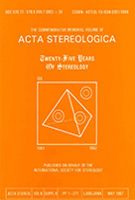Random rotations in simulation with computer 3-D reconstruction
Abstract
Simulation is used to estimate the distribution of orientation-dependent measurements made on 3-dimensional objects. Various methods are examined for generating the orientations in which measurements are made. The different methods lead to ways of checking the distribution of the resulting rotation matrices. The most efficient in terms of the number of random variables required and the mechanism for constructing the matrix is chosen. The simulation is incorporated within an interactive user-friendly computer package referred to as GLOM. Objects are represented by their outlines on serial sections which are traced into the computer via a bitpad and reconstructed into a 3-dimensional polyhedral representation. A potato is used as an example. Caliper diameters are measured by giving the reconstructed potato an isotropically Uniform random (IUR) rotation and finding its length in a fixed direction. The distribution of caliper diameters is found and used to estimate the mean caliper diameter.

